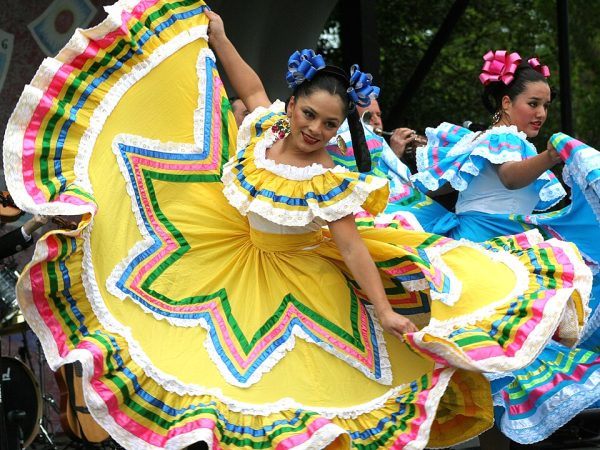Different Gender Dynamics In Mexican Households
Culturally, Mexican households have held their daughters to a higher standard than their sons. Junior Arturo Cortez holds a soccer ball and junior Lauren Saldivar holds a broom. They go against each other holding a stereotypical item.
For decades, Mexican households have had different expectations and gender dynamics. These dynamics include the mother of the household, the father, and the children.
In a way, every person in the house plays an important role. The wife is expected to cook, clean, and take care of the children. The husband is expected to work and provide for his family, while the children are expected to go to school and do better than what their parents did.
“To this day, in my little town in Mexico, machismo still exists,” Irma Sanchez, mother of Gabriella Moore, said. “They wake up. They make the food and have no help from the husband. It affected me, and I suffered a lot. I couldn’t talk to my family without my husband getting jealous, and I had to do whatever he told me to do.”
The way parents raise their children might vary greatly between generations. even further back, to the era of their grandparents.
“The reason that most Mexican American households are structured the way that they are, in my opinion, has to do with the pain that is rooted within our culture,” college student Abigail Moore, daughter of Gabriella Moore said. “It started with the way our parents and grandparents would work. You had to work as if your life depended on it. I personally felt as if my mother expected so much of me. Eventually, things like work, expectations, and even the way we needed to treat people got passed down from different generations.”
At times, parents expect much of their children, which can limit opportunities with friends.
“My dad was a great example of a parent that showed us to work hard and be successful,” Gabriella Moore said. “While growing up, I did resent my dad at times because he was very hard on me and my siblings. We had little interaction with anyone outside of our family circle, which made it hard to fit in.”
Some of the expectations vary between older and younger siblings. Usually, the older sibling is expected to do the most.
“As the oldest, I feel like there are a lot more expectations for myself,” junior Alexsa Alvarado said. “Even now, I notice that they aren’t as hard on my siblings as they were on me when I was younger. The expectations consisted of doing good in school. If I lacked even a little, they got mad, even if I was doing good in everything else.”
In some households, boys and girls are treated differently by their mothers and fathers. Things like responsibilities, sports, and home life are seen differently for both genders.
“Boys have more freedom within our culture,” Abigail Moore said. “Girls are expected to stay home and tend to the house. This is true in rural parts of Mexico. It’s the macho mentality that men have, but again, it is still true in many Mexican households today.”
Different indigenous households can mean different ways children are taught and treated. Both Mexican and other indigenous cultures can be similar in many ways as well.
“Boys in Caribbean households are treated way better than girls,” junior Esther Bien-Aime said. “Many Haitians believe that girls are the caretakers, and the boys aren’t told to do anything. I always found this unfair and would speak out about it, but sadly it still occurs.”
Recent generations have broken the cycle of past generations after not wanting to repeat the same habits their parents once did. It has changed the culture, and the way their kids view it.
“Some grow up and break the cycle. Others find it as an excuse to justify their actions,” Gabriella Moore said. “I didn’t marry within my culture. I refused to be a statistic. At a young age, I knew my worth, and I wouldn’t allow myself to be placed in that situation. I chose to change my parenting skills to allow a little freedom yet still instill our family values.”
Your donation will support the student journalists of Logansport High School. Your contribution will allow us to purchase equipment and cover our annual website hosting costs.

Emily Sanchez is a senior this year and has been involved in Magpie since her freshmen year in 2020. She currently serves as co-Managing Editor and enjoys...










